On the morning of August 11, comrades Tran Duc Thang, member of the Party Central Committee, Secretary of the Provincial Party Committee; Trieu The Hung, Deputy Secretary of the Provincial Party Committee, Chairman of the Provincial People's Committee met and had a dialogue with officials, civil servants and public employees of the education and training sector of Hai Duong.
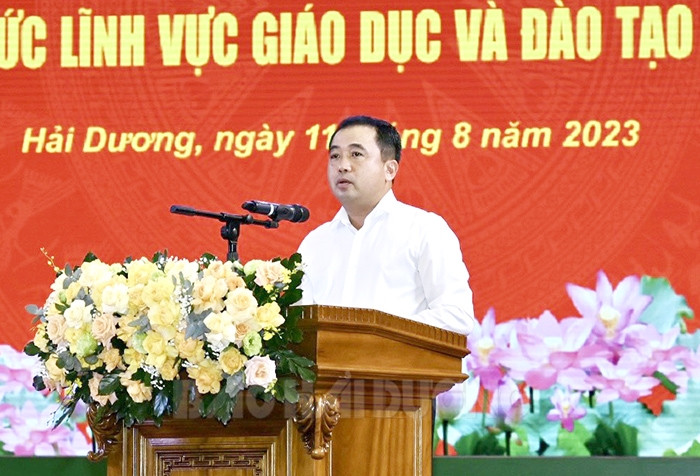
Comrade Tran Duc Thang, Member of the Party Central Committee, Secretary of the Provincial Party Committee, spoke at the dialogue conference.
Comrades in the Provincial Party Standing Committee, the Standing Committee of the People's Council, leaders of the People's Committee, a number of provincial departments, branches and sectors, leaders of the People's Committees of districts, towns and cities, and more than 1,100 cadres, civil servants and public employees in the education and training sector attended.
Speaking at the opening of the conference, Secretary of the Provincial Party Committee Tran Duc Thang emphasized that under the direction of the Ministry of Education and Training, the Provincial Party Committee, the Provincial People's Council, the Provincial People's Committee, the Party Committees and local authorities and the support of the people, especially the continuous efforts of the staff, civil servants and public employees, the Hai Duong education and training sector has had many positive and outstanding changes, achieving very commendable achievements. The sector has done a good job of advising the Party Committees and authorities at all levels; Actively innovate management work, create unity and mobilize the active participation of the whole society in caring for and investing in education development, create favorable mechanisms and legal corridors to develop education and training in the spirit of Resolution 29-NQ/TW dated November 4, 2013 of the Central Executive Committee of the Party (11th tenure) "on fundamental and comprehensive innovation of education and training, meeting the requirements of industrialization and modernization in the conditions of a market economy, socialist orientation and international integration" to ensure effectiveness and suitability to local realities...
However, the education and training sector of the province still has limitations, difficulties and challenges such as the quality of education at all levels and grades is not really solid and not uniform. School and classroom facilities, teaching aids and equipment are still lacking and do not meet requirements. The rate of investment expenditure for development and mobilization of social resources for investment in education and training is still low.
The Provincial Party Secretary hopes that the meeting and dialogue will clarify urgent, important issues, difficulties and obstacles of the education and training sector so that all levels and sectors can frankly acknowledge and find solutions to resolve them within their scope and authority. Thereby, it will help the Provincial Party Committee, Provincial People's Council, Provincial People's Committee as well as Party committees, Party organizations at all levels, and functional agencies to have policies and measures to lead and direct closely, correctly and promptly to improve the quality and effectiveness of education and training work in the province, meeting the integration and development trends of the country...
Innovation but still many difficulties
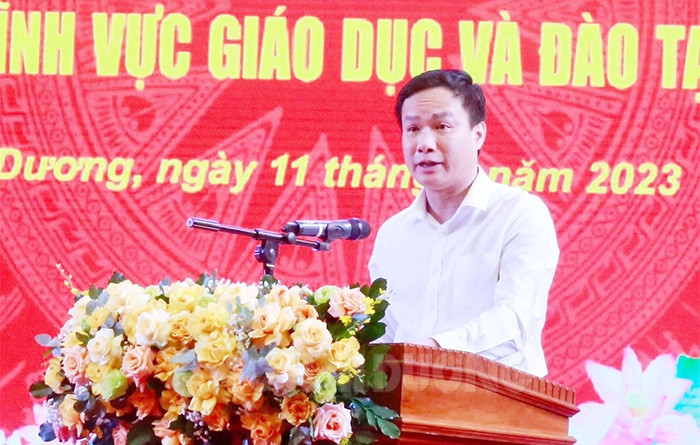
Comrade Trieu The Hung, Deputy Secretary of the Provincial Party Committee, Chairman of the Provincial People's Committee, reported briefly on the current situation of education and training associated with the implementation of Resolution No. 29.
Reporting on the current situation of education and training, Chairman of the Provincial People's Committee Trieu The Hung said that in recent years, the Provincial Party Committee, People's Council, and People's Committee have concretized Resolution No. 29 with resolutions, plans, programs, and projects to implement education and training in the direction of developing learners' qualities and capacities; combining teaching people, teaching literacy, and vocational training. In the period of 2013-2023, Hai Duong province has issued many policies, strategies, and mechanisms to create changes in the development of education and training in both scale and quality, focusing many investment resources on education. Hai Duong is continuously one of the top 10 provinces and cities in the country in terms of the quality of excellent students... The quality of mass education is maintained and improved every year; Higher education and vocational education provide multi-disciplinary and multi-field training and foster high-quality human resources, making an important contribution to the construction and development of Hai Duong province, the northern coastal region and the whole country.
The new general education program is implemented in the direction of streamlining content; developing learners' qualities and abilities; increasing practice and applying knowledge to practice. The forms and methods of examination, testing and assessment of educational and training results are fundamentally innovated, ensuring honesty and objectivity. The team of teachers and managers are given attention to develop, meeting the requirements of educational and training innovation in the new situation. Facilities, equipment and machinery are invested in basically meeting the requirements of the new general education program.
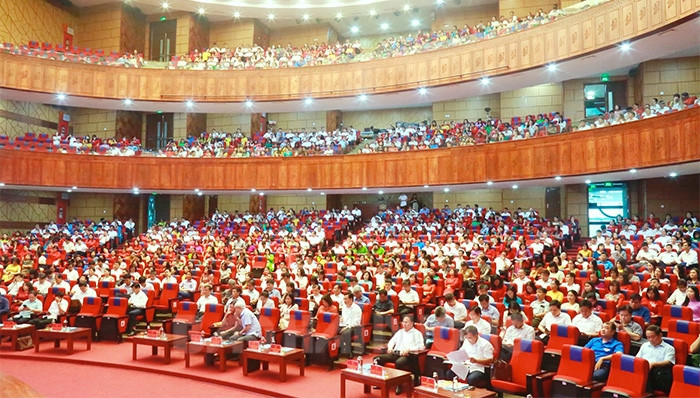
More than 1,100 delegates attended the conference to meet and dialogue between leaders of Hai Duong province and officials, civil servants and public employees of the education and training sector.
However, the development of education and training associated with the implementation of Resolution 29 also faces many difficulties. The role of state management, the coordination of sectors in advising on construction, planning, forecasting the growth of student numbers, and the pressure on facilities, schools, and classrooms are still limited. Many schools currently do not have enough area according to regulations or are no longer able to expand their campuses on site, especially schools in urban areas and densely populated areas that do not have land to build or expand schools. The overall quality of education in some educational institutions, especially private educational institutions, is still low and has not been properly assessed. The structure of teachers between subjects and levels is not uniform, and there are still local surpluses and shortages in localities and schools. The quality of the teaching staff is uneven. Teacher recruitment is difficult. The teacher/class ratio is lower than the maximum norm prescribed by the Ministry of Education and Training, along with the policy of streamlining the payroll, leading to educational institutions not being able to ensure enough staff for the class size. Hai Duong has not yet attracted many economic sectors to participate in vocational education activities; there are no investment projects for vocational education using foreign capital. Socialization work is facing difficulties due to regulations...
Hai Duong has set out five key tasks for developing education and training in the coming time. The province is determined to make a breakthrough in fundamental and comprehensive innovation in education and training, developing human resources, high-quality human resources to serve industrialization, modernization, and international integration. Building an open education system with a reasonable structure and method of education, associated with building a learning society; ensuring conditions for quality improvement; standardizing, modernizing, democratizing, socializing and integrating the education and training system internationally. Mobilizing the whole society to care for the cause of developing education and training...
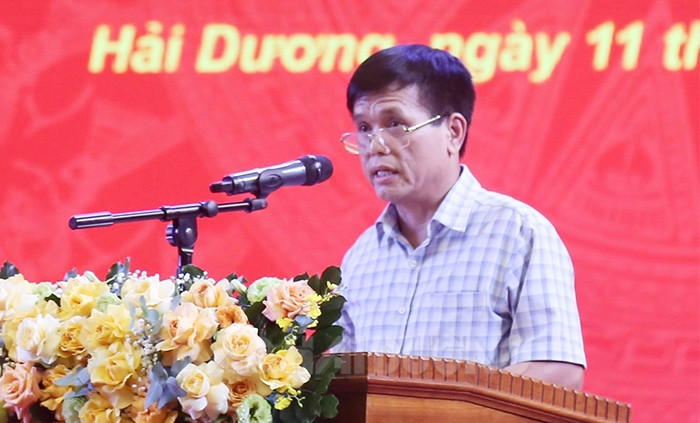
Deputy Director of the Department of Home Affairs Trinh Ngoc Thanh responded to opinions and recommendations of delegates.
Focus on 4 main groups of issues
The conference to meet and dialogue with provincial leaders attracted 178 opinions and recommendations from officials, civil servants and public employees in the education and training sector on four main groups of issues: mechanisms and policies of the Party and State related to the team of officials, civil servants and public employees, solutions to improve quality, attract good teachers to work in the province; facilities and teaching equipment; solutions to improve the quality of teaching and learning, issues on ethics, safety of students and extra teaching and learning; difficulties, obstacles and solutions to promote socialization and attract investment in the field of education and training.
At the dialogue, 31 delegates registered to speak. Because many delegates had overlapping opinions and recommendations, 16 delegates spoke on more than 30 contents belonging to the above 4 groups of issues. Of which, the group of issues that most delegates were interested in was the mechanism and policies of the Party and State related to the team of cadres, civil servants, and public employees, solutions to improve quality, and attract good teachers to work in Hai Duong province.
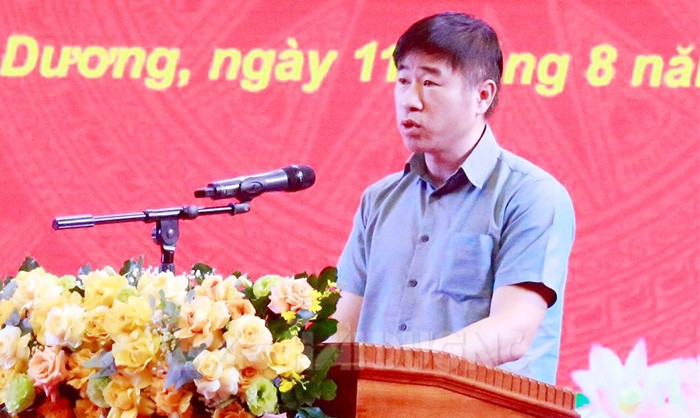
Director of the Department of Planning and Investment Le Hong Dien responded to comments and recommendations regarding investment in education and training.
Many delegates were concerned about the goal of streamlining the education and training sector's payroll that the Provincial People's Committee has planned for the 2022-2026 period, which is to reduce at least 5% of the number of cadres and civil servants and at least 10% of the number of public employees receiving salaries from the state budget compared to 2021. The staff reduction will cause many difficulties for the implementation of the 2018 General Education Program because the actual number of teachers assigned by the province is lower than the regulations of the Ministry of Education and Training. It is recommended that the province have a specific policy for the education and training sector in streamlining the payroll, allowing salaries from revenue sources for revenue-generating units, not streamlining by mechanical staff reduction.
Responding to this issue, the leader of the Department of Home Affairs said that in the total number of public employees receiving salaries from the state budget, the education and training sector accounts for over 86%. Therefore, to ensure a 10% reduction in public employees in the 2022-2026 period of the province according to the target set by the Central Government, the education and training sector must still reduce the number of employees receiving salaries from the budget to complete the plan to streamline the payroll in this period. In 2023, schools will streamline according to the plan. From 2024 onwards, public educational institutions must still reduce the number of employees receiving salaries from the state budget according to the above roadmap, but not mechanically reducing but associated with the transition to receiving salaries from public employees (not from the state budget) on the basis of developing a financial autonomy project guided by the Department of Finance and submitted to the Provincial People's Committee for approval.
There were 19 opinions from groups and individuals suggesting that the province should have a policy to attract talents to the province (excellent and talented pedagogical students...) through recruitment mechanisms and other preferential policies for the teaching staff.
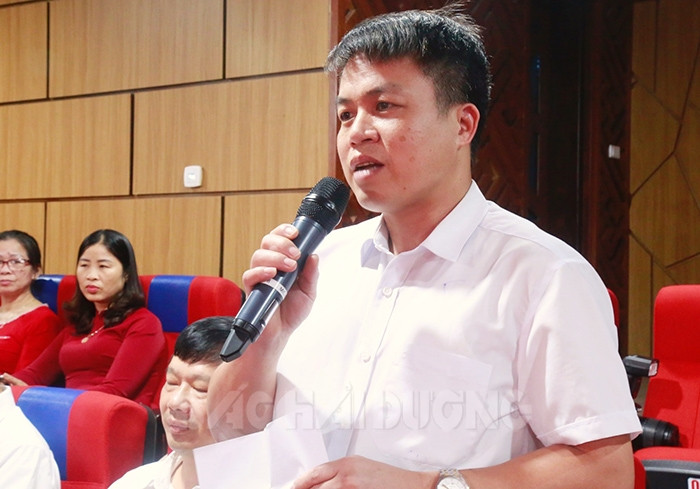
Principal of Tu Ky High School Vu Van Sang proposed that the province organize promotion of professional titles for cadres and teachers through recruitment.
Regarding this issue, the leader of the Department of Education and Training said that the Central Government and Hai Duong province have regulations on policies to attract talents. On July 11, 2019, the Provincial People's Council issued Resolution No. 08/2019/NQ-HDND on policies to attract high-quality human resources and support postgraduate training, award academic titles, and confer titles on cadres, civil servants, and public employees in the province. Regulations on policies to attract high-quality human resources to work in the province include: teachers with achievements in training students who won first prizes in national excellent student competitions, official prizes in regional and international excellent student competitions; excellent graduates, young scientists according to regulations... In 2020 and 2022, the Department of Education and Training will organize recruitment according to these policies to recruit specialized teachers for Nguyen Trai High School for the Gifted. Other educational institutions have not been able to do so because they do not have qualified recruitment sources according to regulations. In the coming time, the Department of Education and Training will coordinate with specialized agencies to propose and advise on the development of remuneration policies for teachers in the province, especially preschool and primary school teachers, to attract recruitment sources, improve the quality of life for teachers, and reduce the number of teachers leaving the profession due to low income...
Many delegates proposed that the State increase salaries for teachers at all levels. Responding to this issue, the leader of the Department of Education and Training said that Resolution No. 69/2022/QH15 dated November 11, 2022 of the National Assembly on the state budget estimate for 2023 stipulates that from July 1, 2023, the basic salary for cadres, civil servants and public employees will be increased to VND 1,800,000/month. Thus, the basic salary of cadres, civil servants and public employees will increase by 20.8% compared to the current regulation (VND 1,490,000). The Ministry of Education and Training has proposed that the National Assembly and the Government consider raising the preferential allowance for preschool teachers from 35% to 70%; preschool teachers working in areas with particularly difficult socio-economic conditions will receive 100%. The Ministry is also drafting a document to the Government proposing the development of a decree regulating preferential allowances for teachers, with 8 allowance levels from 25-100%.
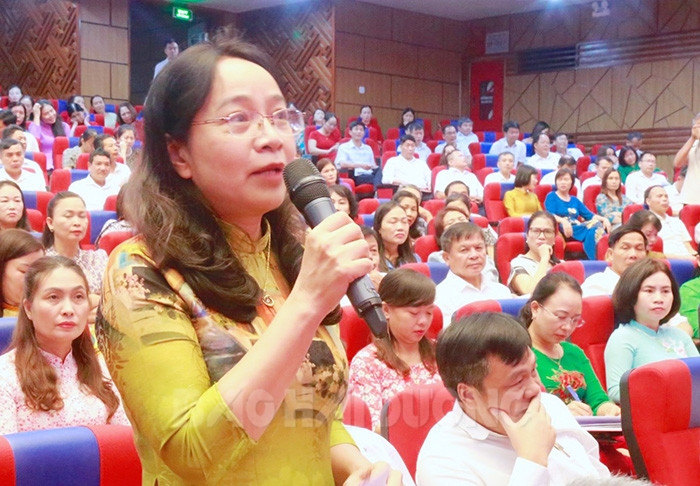
Chairwoman of the Council of Hai Duong Central College of Pharmacy Nguyen Thi Huong proposed a policy to support tuition fees for students in the province studying at vocational training institutions.
Many delegates asked the province to let them know what solutions it will have in the coming time to effectively deploy the capital allocated by the Central Government, balance and arrange local budgets and effectively integrate investment capital sources from national target programs to invest in building school facilities, purchasing teaching equipment to meet the needs of implementing the 2018 general education program and the requirements of Circular No. 13/2020/TT-BGDDT dated June 25, 2020 of the Ministry of Education and Training on building national standard schools.
Responding to this issue, the leader of the Department of Finance said that the budget for purchasing teaching equipment to meet the needs of implementing the 2018 general education program is based on the ability to balance the local budget. Every year, the Department of Finance presides over and coordinates with relevant agencies and units to advise the Provincial People's Committee to focus resources to prioritize funding for the Department of Education and Training and the District People's Committees to purchase teaching equipment to meet the needs. Regarding the consultation on the development of the Project "Improving the quality of building national standard schools at all levels in the period of 2022-2025, with a vision to 2030", the Provincial People's Committee has assigned the Department of Education and Training to preside over, coordinate with relevant agencies and units to develop and advise the Provincial People's Committee to consider and decide. However, up to now, the project has not been approved by the competent authority. Therefore, it is recommended that the Department of Education and Training promptly report to the Provincial People's Committee on difficulties and obstacles for resolution. Based on the approved project, the Department of Finance will continue to coordinate with the Department of Planning and Investment to preside over the local budget balance capacity, focus resources to advise the Provincial People's Committee to submit to the Provincial People's Council to allocate funds to build school facilities and the requirements of Circular No. 13 of the Ministry of Education and Training.
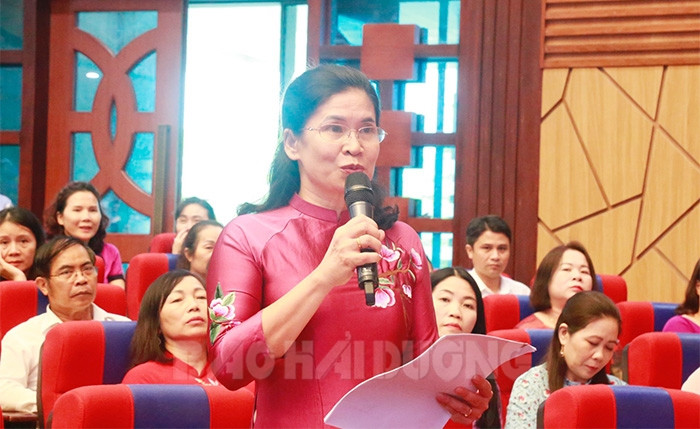
Head of the Department of Education and Training of Cam Giang district, Pham Thi Oanh, raised concerns about land funds for education.
At the dialogue, many other opinions and recommendations of delegates related to investment in facilities for vocational schools; land funds for education and training development; tuition fees; support for teachers to study to improve their qualifications; exams to promote teachers; selection of new textbooks; streaming; forecasting the labor market, job demand... were answered by leaders of the province's professional agencies.
Immediately resolve some issues under the province's authority
Concluding the conference, Secretary of the Provincial Party Committee Tran Duc Thang assessed that the cadres, civil servants and public employees of the education and training sector had made quite comprehensive recommendations on issues that society is currently very concerned about. This demonstrates a sense of responsibility, love for the profession, and a desire for the education and training career of Hai Duong province to develop further.
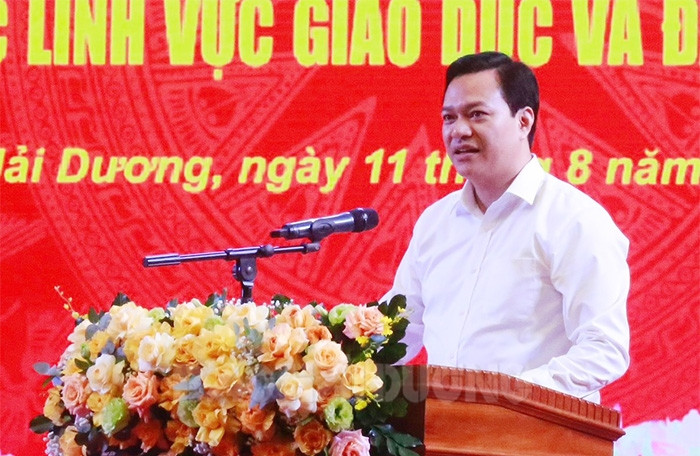
Director of Department of Natural Resources and Environment Hoang Van Thuc responded to comments and recommendations
The leaders of the provincial departments and branches have basically responded closely to the opinions and recommendations raised by the delegates. The Party Committee of the Provincial People's Committee has been assigned to direct agencies and units to continue reviewing and synthesizing opinions and recommendations and respond in writing; propose solutions to resolve issues under the province's authority.
The Provincial Party Secretary informed that on August 10, 2023, the Chairman of the Provincial People's Committee signed a decision on developing policies to encourage and attract social investment projects in a number of fields, including education. Accordingly, the province exempts all land rent when non-state economic sectors invest in education. This once again affirms that Hai Duong always cares about and takes care of the development of education and training.
For some groups of issues that delegates proposed at the dialogue session that are under the province's jurisdiction, if there are regulations, they must be implemented immediately. Pay attention to policies to support tuition fees for students going to vocational training; exams to promote teachers' ranks and rankings; improve teacher quality through training. Localities must guide facilities to register their needs so that departments and branches can organize training and development...
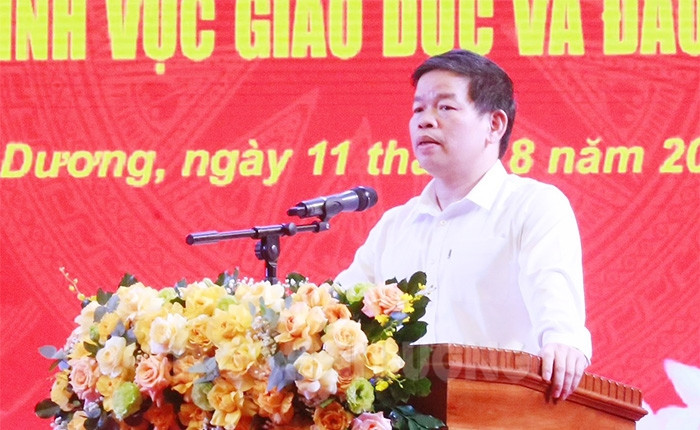
Director of the Department of Education and Training Luong Van Viet answered many questions that delegates were interested in.
Hai Duong currently has over 2.1 million people. Each year, on average, the whole province has about 30,000 people reaching working age. The annual labor demand is very large. Labor market forecasting is very important, but provincial agencies have not done this well. Assign the Department of Planning and Investment, Labor, War Invalids and Social Affairs to have annual and regular forecasts, publicly posted on the provincial electronic information portal, the more detailed the better for each field and profession. On the other hand, research and post information on the ability to meet job positions and recruitment work of each agency, unit and enterprise. Only then will educational institutions have the right direction in training work. State agencies need to organize meetings with enterprises with large labor demand and educational units to carry out this task.
Teachers' income is currently low, especially for preschool teachers. In addition to the central government's policies, departments and branches need to advise the province to issue their own preferential policies, but they must be suitable to the local capacity.
Hai Duong does not lack land for education and training and always encourages attracting social investment for this cause. However, many investors still do not know. Therefore, it is necessary to publicize all land funds that the province attracts in all fields, including education and training, to post on the provincial Electronic Information Portal.
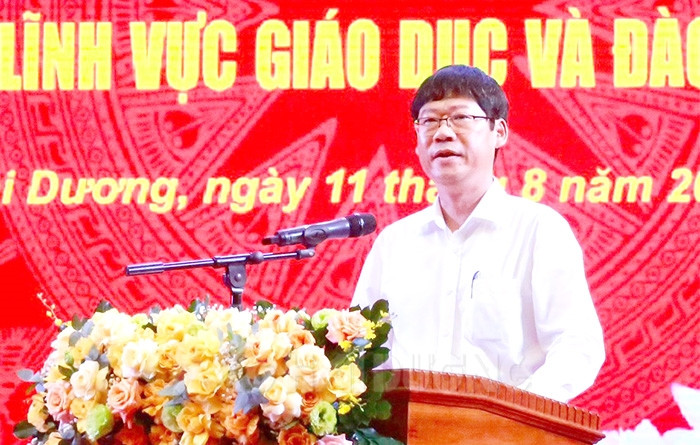
Deputy Director of the Department of Labor, War Invalids and Social Affairs Vu Tri Quang answers questions related to vocational education
For some groups of issues under the authority of the Central Government such as streamlining staff, building schools that meet national standards, selecting new textbooks, etc., the Provincial Party Secretary assigned relevant departments and branches to promptly make recommendations to superiors.
The Provincial Party Committee Standing Committee assigned relevant agencies to promptly respond to and resolve the opinions and recommendations of the delegates raised at the dialogue, and complete the report before December 31. The Provincial Party Committee's Mass Mobilization Commission was assigned to coordinate with the Provincial Party Committee Office to regularly monitor and urge the implementation, and report periodically.
TIEN MANH - THE ANH